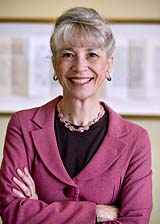Bates Matters
 The story in this issue on the new Peer Writing Project underscores how Bates’ newest general-education requirements reaffirm one of the oldest hallmarks of a great education: learning to be a better writer. At Bates, faculty and students are creating a community that cares about good writing.
The story in this issue on the new Peer Writing Project underscores how Bates’ newest general-education requirements reaffirm one of the oldest hallmarks of a great education: learning to be a better writer. At Bates, faculty and students are creating a community that cares about good writing.
To explore another avenue through which students can play a more engaged role in this initiative, I offered a 2007 Short Term course using peer editing. In this form of collaboration, students form small groups outside class time to share their work through various stages of revision. To guide us we took Peter Elbow’s Writing without Teachers, which provocatively argues that students of writing can learn more from working with each other than from teachers or experts. Elbow’s method helps aspiring writers tackle the toughest part of writing: actually communicating to their readers, or “getting things inside someone else’s head,” as Elbow puts it.
Participants in our peer editing groups were charged above all to take each other’s writing very seriously, but not to judge it. Readers strove to show not what’s right and wrong, but what they saw, heard, and felt. This sounds easy and even undisciplined, but anyone who tries it will learn otherwise. A formidable task, it exacts generosity and selflessness on the part of readers and courage on the part of writers.
The power of this kind of peer editing comes from the underlying principles of what Elbow calls the “believing game,” best understood as the complement and opposite of critical thinking, or the “doubting game.” A significant intellectual tool and the cornerstone of a liberal arts education, the doubting game orders us to look for the error in each assertion, flexing the firm muscles of debate and argumentation. It also tells us to hold what we often refer to as our subjectivity — our fears and our wishes, preconceptions, experiences, and commitments — to one side.
The believing game is played with different rules. After collecting as many assertions and opinions as possible, the more diverse the better, we consider that each might be true. We rigorously scrutinize them first for their strengths, not their weaknesses. To comprehend those strengths fully, moreover, we try to share the experience of the person who brought the idea forward. The believing game thus asks for the opposite of objectivity, requiring what Elbow calls “not an act of self-extrication, but an act of self-insertion, self-involvement — an act of projection” that expands our frame of reference.
A peer-editing process grounded in believing does not offer shortcuts to producing an elegant essay or a compelling report; if anything, going back to the computer and producing that final version is more complicated and time consuming, because our minds are full of so many more and different ideas and perspectives than we began with. And ultimately we edit and rewrite alone, organizing thoughts, finding words, crafting sentences, and building coherent paragraphs into a cogent argument all by ourselves.
Students in my Short Term course described the peer-editing process as a journey marked by uncertainty, growth, new relationships, and emerging confidence. In a journal entry, Vasey Coman ’10 of Winters, Calif., noted how people voiced frank criticisms with respect: “They were nice about telling me that they could hardly understand entire pieces of my paper!” It was as if “I was their grandmother and they were treating me in the careful, delicate way grandmothers should be treated.”
Sarah Davis ’10 of Great Falls, Va., wrote that “taking more risks and becoming more vulnerable…[is] a messy process. Just like newborn deer, we’re wobbly with our first steps.” But soon, “everyone took it in stride.”
Understandably, students still cared what their teacher thought. Jake Lewis ’09 of Katonah, N.Y., appreciated the group’s progress but worried that “I’m still not going to make the improvements the president/professor wants.”
But ultimately Jake and his peers took responsibility for that final draft. Rachel Kurzius ’10 of Ridgewood, N.J., compared the experience to finding oneself in a “maze with thousands of possibilities for reaching the center…. We all explained our preferred routes, but only the author could really decide which turns to make.”
To guide students through the maze of possibilities within and beyond their disciplines, Bates teachers present an array of intellectual tools. Bates students, in turn, are ready and able to enter into the perspectives of others in order to test, strengthen, and communicate their own ideas.